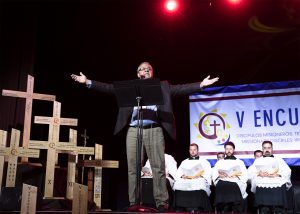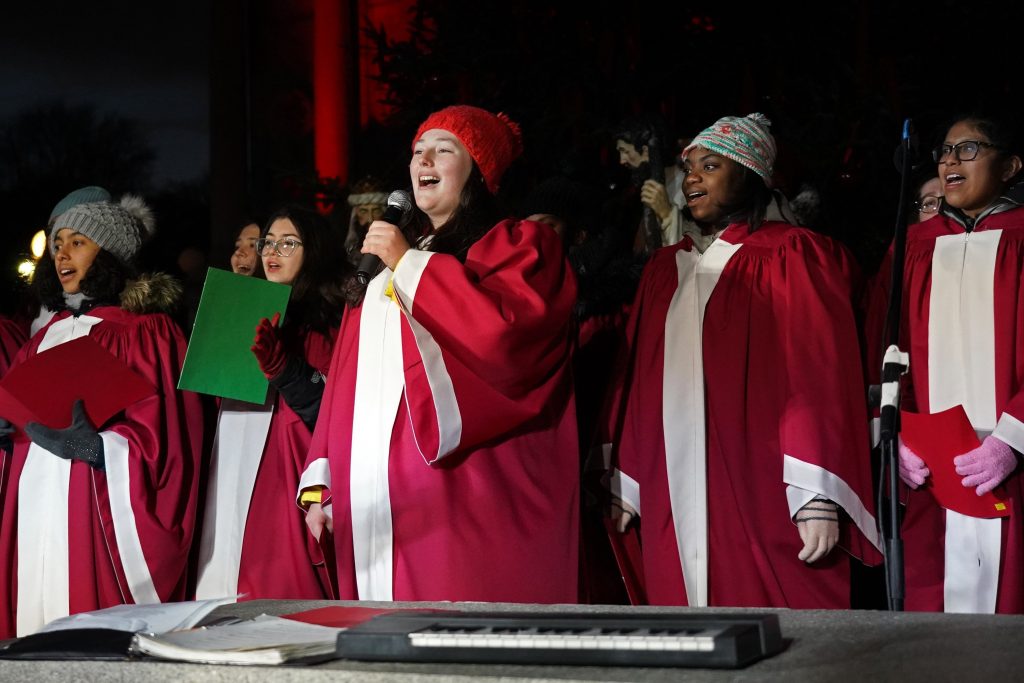Angelenos who like music are spoiled for choice this time of year. There are more concerts in this city than people have time or money to attend. Our local radio stations are filled with Christmas music of all styles. You can’t escape the sounds of the season.
Music is an important part of Advent and Christmas. Our memories are kindled by old and familiar songs, comforting us with ritual, tradition, and continuity.
One might adapt the familiar Spanish proverb “Dime con quién andas, y te diré quién eres” (“Tell me who you hang around with, and I’ll tell you who you are”) to “Tell me what you listen to, and I’ll tell you who you are.” Typically, the music we relate to reflects our age, hometown, education, life experience, social class, and ethnic community. Music expresses and builds identity.
Music also has a deep, ancestral connection to spiritual experience. In the overwhelming majority of religions and cultures, music and worship are inseparable.
Early Christians inherited the chants of the synagogue, which developed into Byzantine chant and medieval plainsong, the ancestor of modern classical music. For much of the first millennium, music was integral to public worship. Scripture was sung and Christians experienced the psalms musically — in and with the body.
The Fathers of the Church taught that the structure and harmonies of music reflected the order and beauty of the cosmos. An important part of a clergyman’s curriculum in early medieval universities was “musica speculativa,” the study of the theoretical and philosophical aspects of music.
However, with the Renaissance, music began to be less integral to study, faith, and prayer. It gradually stopped being considered an essential element in a well-rounded and spiritually mature life. Instead, it developed its own, autonomous existence, unmoored from faith.
Sadly, the connection between music and faith is still broken. It is hard to think of a living composer with the degree of fame as Catholic composers of the past like Mozart, Vivaldi, and Haydn, or Christians such as Bach (Lutheran) or Tchaikovsky and Rachmaninov (Orthodox).
“Sacrosanctum Concilium” (“Constitution on the Sacred Liturgy”), the document of the Second Vatican Council on liturgy, declared that “the musical tradition of the universal Church is a treasure of inestimable value, greater even than that of any other art.” But many of that document’s recommendations are still unrealized. Few clergy and lay pastoral workers have much more than an average appreciation of music. Parish musicians often have to work with limited financial resources and without substantial theological training. And while there are a few excellent theological discussions on music, on the whole the insights have not trickled down to the grassroots.
Why is any of this important? “It is extraordinary,” says a character in one of the plays of the English dramatist Noel Coward, “how potent cheap music is.” However, when it comes to religious music, feeling good doesn’t necessarily mean we are feeling God. There is a difference between sentiment and sentimentality.

Mature faith requires good music. Ritual music — the music we hear at Mass — demands certain skills. But unlike music that is performed for entertainment, good ritual music should not draw attention to itself — and certainly not to the performers. It is part of prayer, which glorifies God and helps us grow in holiness. In the classic definition of St. John of Damascus (circa 675-749), when we pray we lift our minds and hearts to God. “Minds and hearts” suggests that prayer is not only about feelings. It involves truth, too.
The Grammy-nominated Catholic composer Pedro Rubacalva is a contributor to a new book on Our Lady of Guadalupe. Recently we had a lively discussion about the different kinds of music used in Guadalupan devotion, in the light of faith, culture and musical education. We speculated whether there ever could be, for example, Guadalupan reggae? Or rock, or rap? The fundamental question is whether particular styles of music — even without words — express religious truth and meaning in their structure, rhythm, volume, instrumentation, and melody.
But if music does contain meaning, is every kind of music fit for use in church? In 1985, then-Cardinal Ratzinger argued that since rock music, with its “anarchic idea of freedom,” stresses individualism and lack of responsibility, it is the complete opposite of what Christians mean by freedom. It therefore cannot be used in Catholic worship. Not everyone agreed. But Cardinal Ratzinger’s deep reflection on the place of music in faith and worship was an accomplishment in itself — and still today should lead to some musical soul-searching.
Pope Francis has rightly insisted on the importance of good preaching: “Evangelii Gaudium” (“The Joy of the Gospel”) contains a whole section dedicated to the topic. The working document of the synod reports that the calls for “deeper homilies” are being heard across the world.
However, neither document references music: the word proclaimed is understood to be spoken and read, not sung.
Good homilies, however, are only one of many things that may attract people to a particular parish. Music can also draw people in. Catholic leaders have started to take note of music’s effect on faith. In 2020, the United States Conference of Catholic Bishops called for hymns which truly reflect our faith, pointing out the wonky theology of some well-known — and well-loved — hymns.
Beauty in worship feeds the soul, by lifting it above this world and offering a glimpse into the world to come. Many different kinds of good music can open those windows into heaven.
Catholic life in this country is strong on goodness. We have the consolation of the truth. But we have work to do on beauty. “Beauty,” says Dostoyesky, “will save the world.”
Music cannot save us on its own. But it can play its part in bringing us closer to God.

